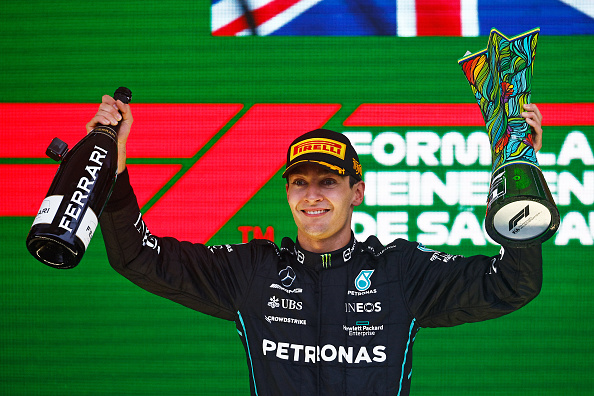George Russell win could help Formula 1 find its competitive mojo again

Formula 1 got its 20th British race winner on Sunday when George Russell triumphed in Brazil, and it’s exactly what the sport needed as fears of a new era of one-constructor dominance were allayed.
F1’s excitement depends on wheel-to-wheel racing around circuits in some of the world’s most iconic motorsports locations, but when one outfit dominates race after race the travelling circus loses its sheen.
Mercedes were the dominant force for a number of years, winning the last eight constructors’ titles – they will hand that title over to Red Bull this year – but in 2022 the Silver Arrows have been off the pace.
It’s taken 21 Grands Prix to pass the chequered flag in first place, courtesy of Russell as part of a team one-two, and it’s difficult not to be happy to see it.
While Ferrari are finding their feet as a major competitor again – they’ve struggled with communication at key times this year – the albeit minor resurgence of Mercedes as the teams prepare to head into the winter break is good news for the sport.
The Silver Arrows of Russell and seven-time world champion Lewis Hamilton are in a battle with the Prancing Horses of Charles Leclerc and Carlos Sainz for second place in the team competition. One place in the ranking can be worth as much as $20m, so it is of significant importance to budgets.
Formula 1 cannot continue to be a series of dominance by the few, and that is why there is so much emphasis on budget caps and new rules in 2026.
A competitive Mercedes is good for the sport, so long as other teams get the chance to close the gap to the main players.
This weekend will see the Abu Dhabi Grand Prix take place for the 11th time. It has become the new season finale and last year saw more fireworks than any pyrotechnic display could have mustered.
In 2021 Hamilton was on course to win his eighth title only for race control and bad luck to take it away from him. This year there’s less on the line.
The two titles are wrapped up and there’s little to play for bar the also-rans’ order, but that doesn’t mean the drama levels will drop too much.
World champion Max Verstappen showed the other side to his fiercely competitive nature at the weekend when he refused to let his team-mate Sergio Perez through on the final lap, having been ordered to overtake the Mexican on the condition he’d rescind the place if he was unsuccessful in going on to take the next car.
Leclerc, too, appeared to begin an internal spat at Ferrari by almost guilt tripping his team into asking his team-mate Sainz to give up his podium for the Monegasque driver. The team refused.
During a safety car period, even the eventual winner sarcastically asked whether the team would protect him at the front or allow Hamilton to chase.
So while the storylines of title-winners have been put to bed, there are tensions brewing among the big teams. The rivalries are unlikely to match that of Hamilton and former team-mate Nico Rosberg but they will add a new layer of intrigue to the events this weekend and beyond.
Formula 1 with a dominant team becomes less enticing, and it’s beneficial for all if more teams are competitive. And while Russell has added to that with his first win, how the teams approach the season finale and winter testing could be paramount as to what financial and emotional state the teams begin next year in.